Business Ethics and Responsible Management: Case Study Report
VerifiedAdded on 2021/02/18
|12
|4093
|225
Report
AI Summary
This report delves into the realm of business ethics and responsible management, examining the ethical implications of business practices and the role of companies within society. It presents a case study of Tuna companies, highlighting the ethical issues arising from modern slavery within their supply chains, including forced labor and human trafficking. The report analyzes the key stakeholders affected by these issues, such as shareholders, employees, accountants, and the government, and offers recommendations for improving ethical conduct, such as increased transparency and adherence to regulations. Furthermore, it explores the application of ethical theories, specifically teleological theories like ethical egoism and utilitarianism, to guide decision-making. Finally, the report discusses the qualities of ethical leaders and managers, emphasizing the importance of fostering a responsible and ethical organizational culture.
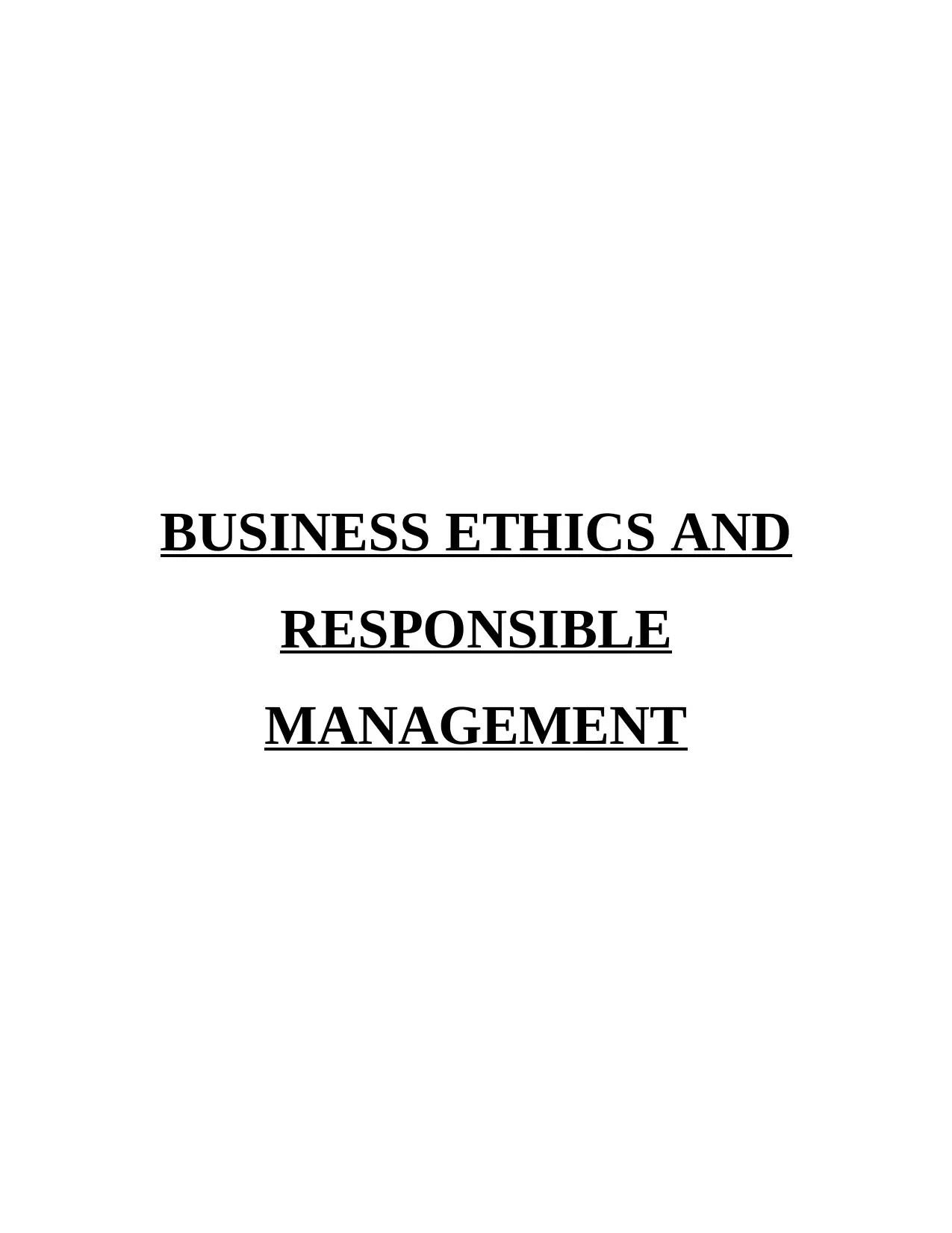
BUSINESS ETHICS AND
RESPONSIBLE
MANAGEMENT
RESPONSIBLE
MANAGEMENT
Paraphrase This Document
Need a fresh take? Get an instant paraphrase of this document with our AI Paraphraser
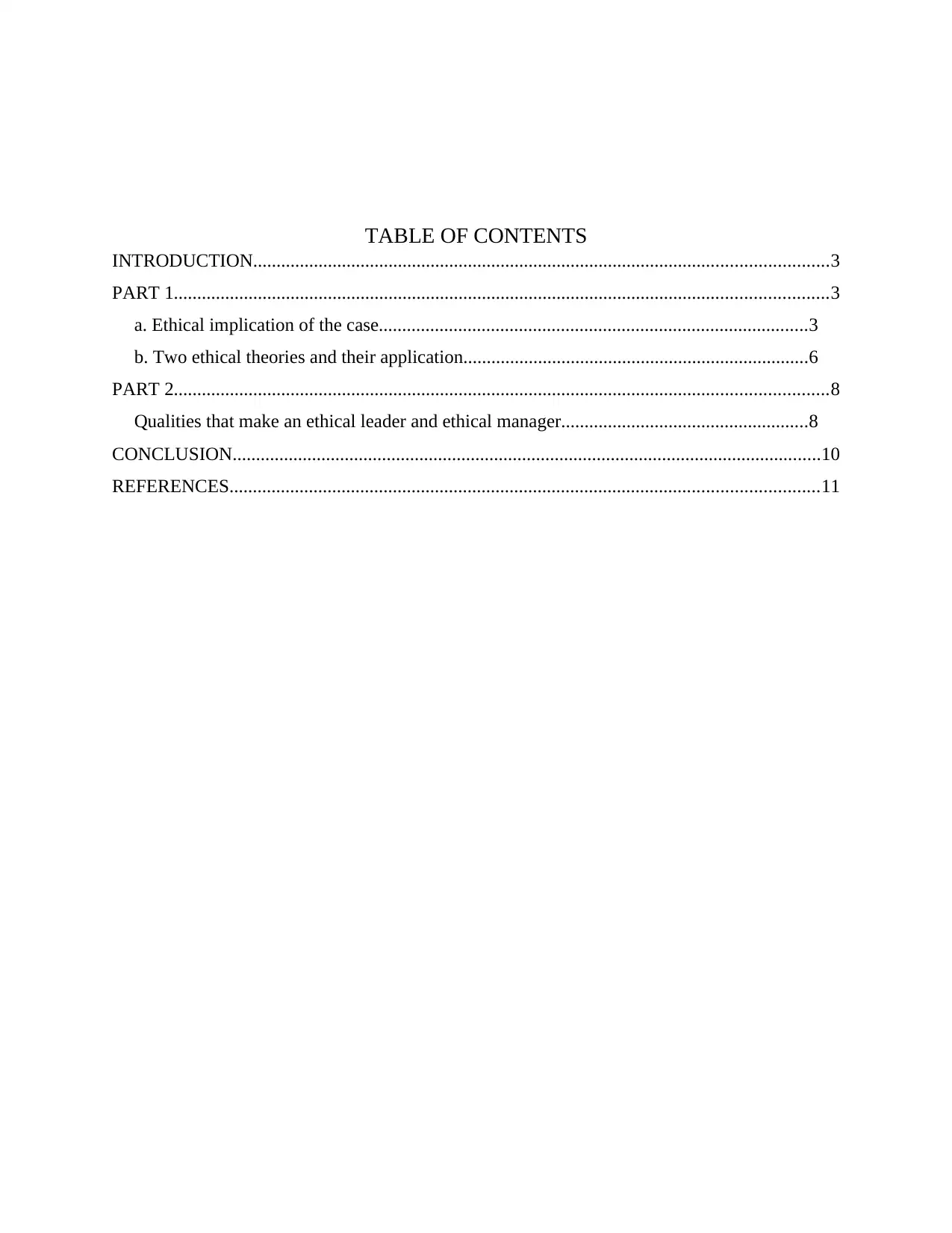
TABLE OF CONTENTS
INTRODUCTION...........................................................................................................................3
PART 1............................................................................................................................................3
a. Ethical implication of the case............................................................................................3
b. Two ethical theories and their application..........................................................................6
PART 2............................................................................................................................................8
Qualities that make an ethical leader and ethical manager.....................................................8
CONCLUSION..............................................................................................................................10
REFERENCES..............................................................................................................................11
INTRODUCTION...........................................................................................................................3
PART 1............................................................................................................................................3
a. Ethical implication of the case............................................................................................3
b. Two ethical theories and their application..........................................................................6
PART 2............................................................................................................................................8
Qualities that make an ethical leader and ethical manager.....................................................8
CONCLUSION..............................................................................................................................10
REFERENCES..............................................................................................................................11
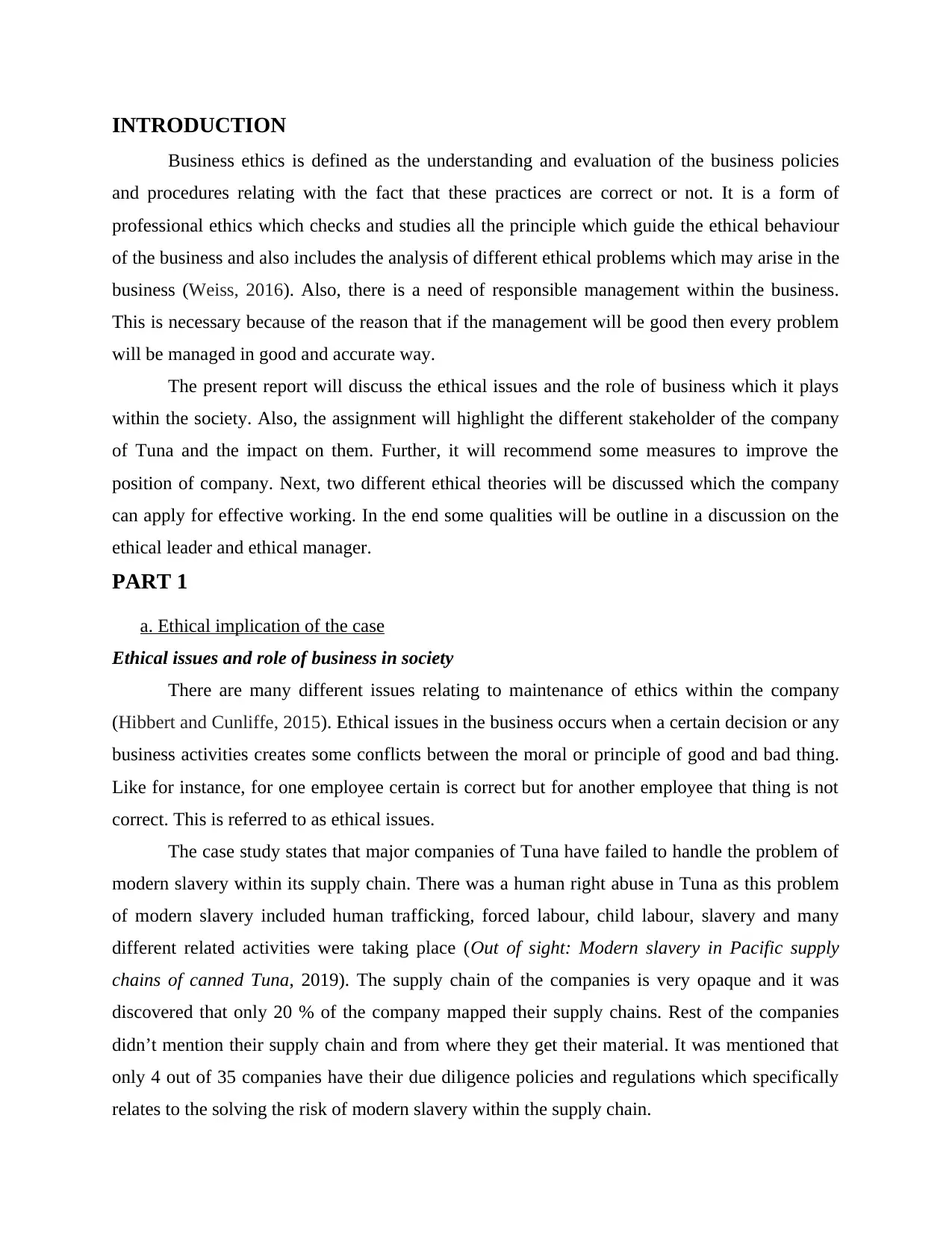
INTRODUCTION
Business ethics is defined as the understanding and evaluation of the business policies
and procedures relating with the fact that these practices are correct or not. It is a form of
professional ethics which checks and studies all the principle which guide the ethical behaviour
of the business and also includes the analysis of different ethical problems which may arise in the
business (Weiss, 2016). Also, there is a need of responsible management within the business.
This is necessary because of the reason that if the management will be good then every problem
will be managed in good and accurate way.
The present report will discuss the ethical issues and the role of business which it plays
within the society. Also, the assignment will highlight the different stakeholder of the company
of Tuna and the impact on them. Further, it will recommend some measures to improve the
position of company. Next, two different ethical theories will be discussed which the company
can apply for effective working. In the end some qualities will be outline in a discussion on the
ethical leader and ethical manager.
PART 1
a. Ethical implication of the case
Ethical issues and role of business in society
There are many different issues relating to maintenance of ethics within the company
(Hibbert and Cunliffe, 2015). Ethical issues in the business occurs when a certain decision or any
business activities creates some conflicts between the moral or principle of good and bad thing.
Like for instance, for one employee certain is correct but for another employee that thing is not
correct. This is referred to as ethical issues.
The case study states that major companies of Tuna have failed to handle the problem of
modern slavery within its supply chain. There was a human right abuse in Tuna as this problem
of modern slavery included human trafficking, forced labour, child labour, slavery and many
different related activities were taking place (Out of sight: Modern slavery in Pacific supply
chains of canned Tuna, 2019). The supply chain of the companies is very opaque and it was
discovered that only 20 % of the company mapped their supply chains. Rest of the companies
didn’t mention their supply chain and from where they get their material. It was mentioned that
only 4 out of 35 companies have their due diligence policies and regulations which specifically
relates to the solving the risk of modern slavery within the supply chain.
Business ethics is defined as the understanding and evaluation of the business policies
and procedures relating with the fact that these practices are correct or not. It is a form of
professional ethics which checks and studies all the principle which guide the ethical behaviour
of the business and also includes the analysis of different ethical problems which may arise in the
business (Weiss, 2016). Also, there is a need of responsible management within the business.
This is necessary because of the reason that if the management will be good then every problem
will be managed in good and accurate way.
The present report will discuss the ethical issues and the role of business which it plays
within the society. Also, the assignment will highlight the different stakeholder of the company
of Tuna and the impact on them. Further, it will recommend some measures to improve the
position of company. Next, two different ethical theories will be discussed which the company
can apply for effective working. In the end some qualities will be outline in a discussion on the
ethical leader and ethical manager.
PART 1
a. Ethical implication of the case
Ethical issues and role of business in society
There are many different issues relating to maintenance of ethics within the company
(Hibbert and Cunliffe, 2015). Ethical issues in the business occurs when a certain decision or any
business activities creates some conflicts between the moral or principle of good and bad thing.
Like for instance, for one employee certain is correct but for another employee that thing is not
correct. This is referred to as ethical issues.
The case study states that major companies of Tuna have failed to handle the problem of
modern slavery within its supply chain. There was a human right abuse in Tuna as this problem
of modern slavery included human trafficking, forced labour, child labour, slavery and many
different related activities were taking place (Out of sight: Modern slavery in Pacific supply
chains of canned Tuna, 2019). The supply chain of the companies is very opaque and it was
discovered that only 20 % of the company mapped their supply chains. Rest of the companies
didn’t mention their supply chain and from where they get their material. It was mentioned that
only 4 out of 35 companies have their due diligence policies and regulations which specifically
relates to the solving the risk of modern slavery within the supply chain.
⊘ This is a preview!⊘
Do you want full access?
Subscribe today to unlock all pages.

Trusted by 1+ million students worldwide
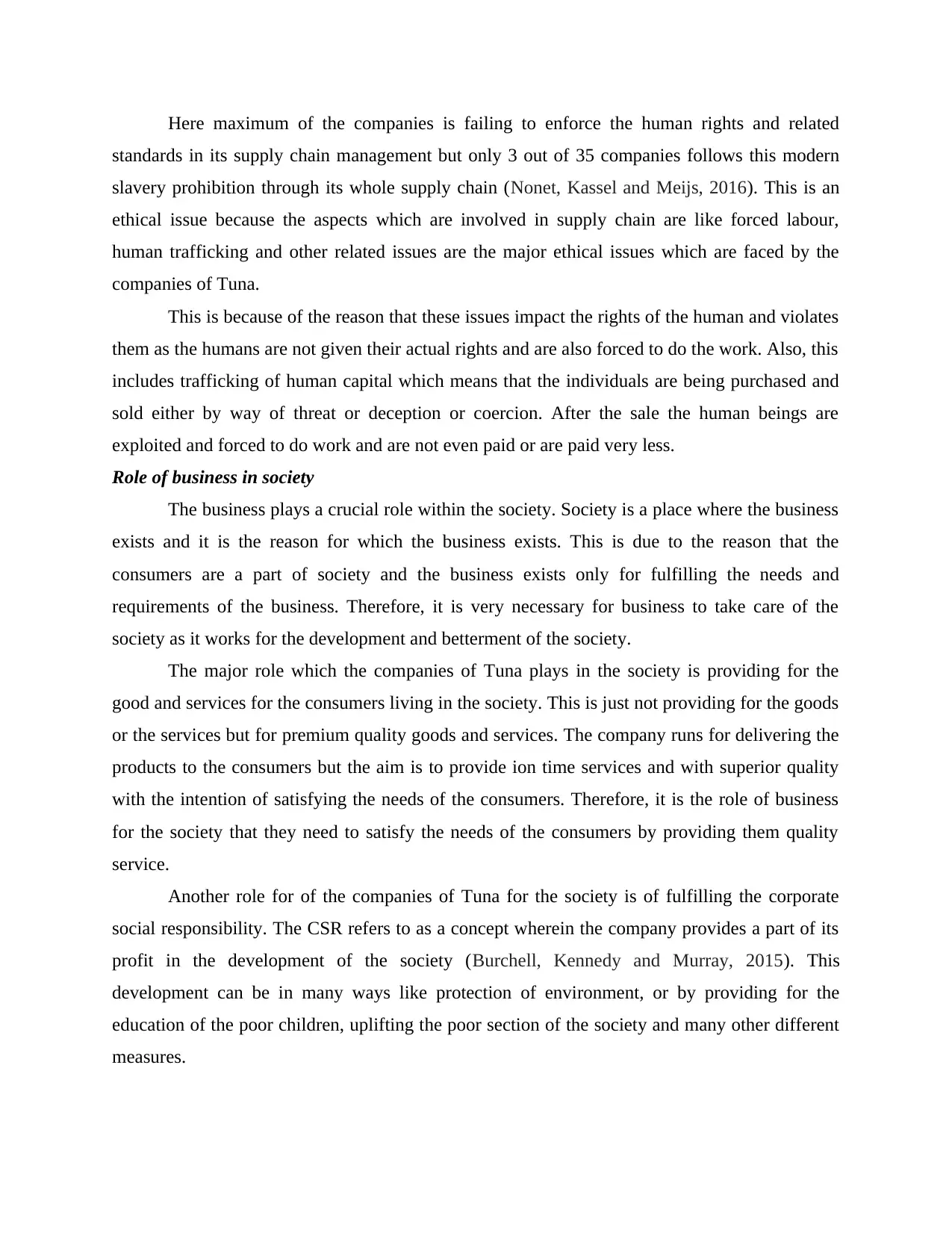
Here maximum of the companies is failing to enforce the human rights and related
standards in its supply chain management but only 3 out of 35 companies follows this modern
slavery prohibition through its whole supply chain (Nonet, Kassel and Meijs, 2016). This is an
ethical issue because the aspects which are involved in supply chain are like forced labour,
human trafficking and other related issues are the major ethical issues which are faced by the
companies of Tuna.
This is because of the reason that these issues impact the rights of the human and violates
them as the humans are not given their actual rights and are also forced to do the work. Also, this
includes trafficking of human capital which means that the individuals are being purchased and
sold either by way of threat or deception or coercion. After the sale the human beings are
exploited and forced to do work and are not even paid or are paid very less.
Role of business in society
The business plays a crucial role within the society. Society is a place where the business
exists and it is the reason for which the business exists. This is due to the reason that the
consumers are a part of society and the business exists only for fulfilling the needs and
requirements of the business. Therefore, it is very necessary for business to take care of the
society as it works for the development and betterment of the society.
The major role which the companies of Tuna plays in the society is providing for the
good and services for the consumers living in the society. This is just not providing for the goods
or the services but for premium quality goods and services. The company runs for delivering the
products to the consumers but the aim is to provide ion time services and with superior quality
with the intention of satisfying the needs of the consumers. Therefore, it is the role of business
for the society that they need to satisfy the needs of the consumers by providing them quality
service.
Another role for of the companies of Tuna for the society is of fulfilling the corporate
social responsibility. The CSR refers to as a concept wherein the company provides a part of its
profit in the development of the society (Burchell, Kennedy and Murray, 2015). This
development can be in many ways like protection of environment, or by providing for the
education of the poor children, uplifting the poor section of the society and many other different
measures.
standards in its supply chain management but only 3 out of 35 companies follows this modern
slavery prohibition through its whole supply chain (Nonet, Kassel and Meijs, 2016). This is an
ethical issue because the aspects which are involved in supply chain are like forced labour,
human trafficking and other related issues are the major ethical issues which are faced by the
companies of Tuna.
This is because of the reason that these issues impact the rights of the human and violates
them as the humans are not given their actual rights and are also forced to do the work. Also, this
includes trafficking of human capital which means that the individuals are being purchased and
sold either by way of threat or deception or coercion. After the sale the human beings are
exploited and forced to do work and are not even paid or are paid very less.
Role of business in society
The business plays a crucial role within the society. Society is a place where the business
exists and it is the reason for which the business exists. This is due to the reason that the
consumers are a part of society and the business exists only for fulfilling the needs and
requirements of the business. Therefore, it is very necessary for business to take care of the
society as it works for the development and betterment of the society.
The major role which the companies of Tuna plays in the society is providing for the
good and services for the consumers living in the society. This is just not providing for the goods
or the services but for premium quality goods and services. The company runs for delivering the
products to the consumers but the aim is to provide ion time services and with superior quality
with the intention of satisfying the needs of the consumers. Therefore, it is the role of business
for the society that they need to satisfy the needs of the consumers by providing them quality
service.
Another role for of the companies of Tuna for the society is of fulfilling the corporate
social responsibility. The CSR refers to as a concept wherein the company provides a part of its
profit in the development of the society (Burchell, Kennedy and Murray, 2015). This
development can be in many ways like protection of environment, or by providing for the
education of the poor children, uplifting the poor section of the society and many other different
measures.
Paraphrase This Document
Need a fresh take? Get an instant paraphrase of this document with our AI Paraphraser
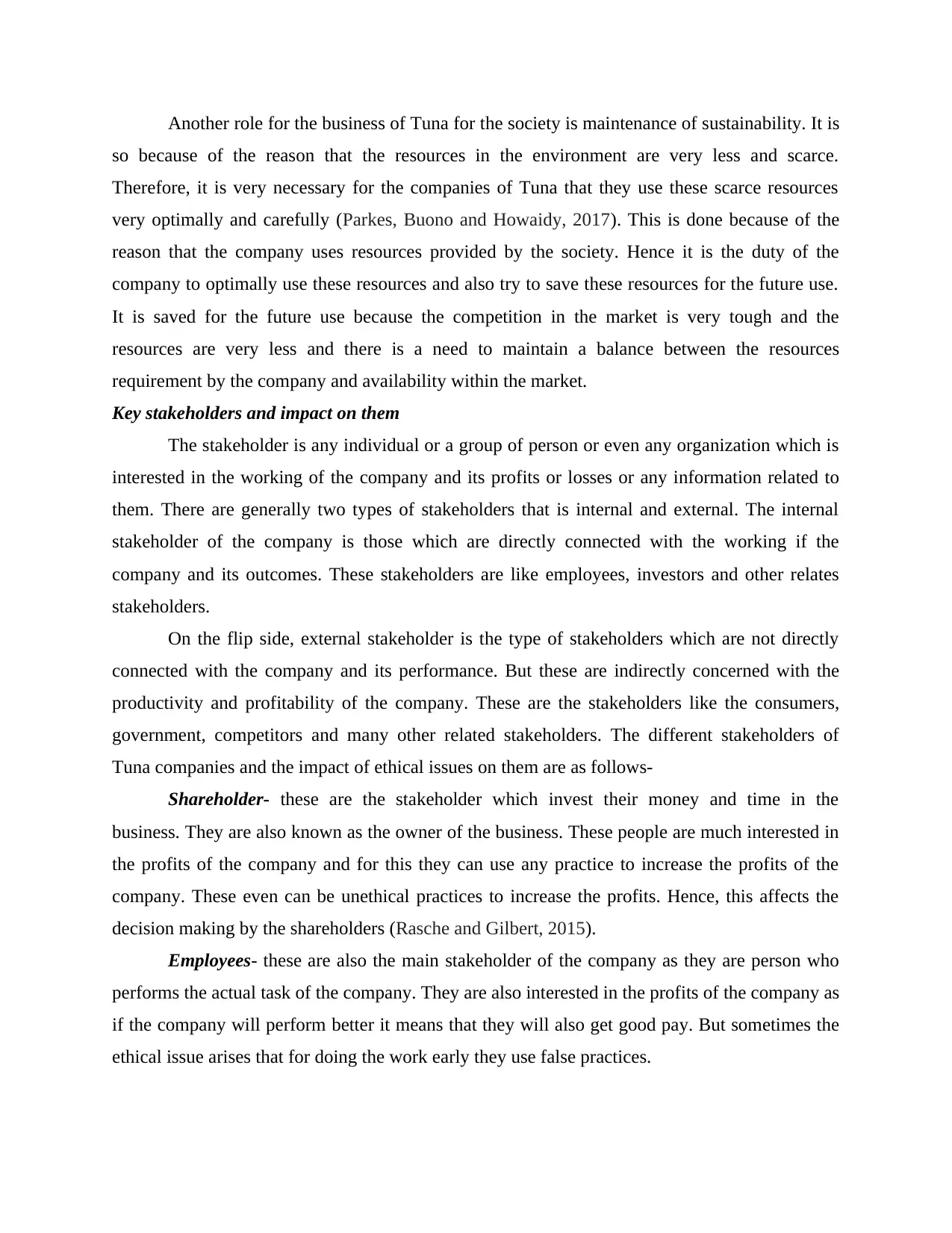
Another role for the business of Tuna for the society is maintenance of sustainability. It is
so because of the reason that the resources in the environment are very less and scarce.
Therefore, it is very necessary for the companies of Tuna that they use these scarce resources
very optimally and carefully (Parkes, Buono and Howaidy, 2017). This is done because of the
reason that the company uses resources provided by the society. Hence it is the duty of the
company to optimally use these resources and also try to save these resources for the future use.
It is saved for the future use because the competition in the market is very tough and the
resources are very less and there is a need to maintain a balance between the resources
requirement by the company and availability within the market.
Key stakeholders and impact on them
The stakeholder is any individual or a group of person or even any organization which is
interested in the working of the company and its profits or losses or any information related to
them. There are generally two types of stakeholders that is internal and external. The internal
stakeholder of the company is those which are directly connected with the working if the
company and its outcomes. These stakeholders are like employees, investors and other relates
stakeholders.
On the flip side, external stakeholder is the type of stakeholders which are not directly
connected with the company and its performance. But these are indirectly concerned with the
productivity and profitability of the company. These are the stakeholders like the consumers,
government, competitors and many other related stakeholders. The different stakeholders of
Tuna companies and the impact of ethical issues on them are as follows-
Shareholder- these are the stakeholder which invest their money and time in the
business. They are also known as the owner of the business. These people are much interested in
the profits of the company and for this they can use any practice to increase the profits of the
company. These even can be unethical practices to increase the profits. Hence, this affects the
decision making by the shareholders (Rasche and Gilbert, 2015).
Employees- these are also the main stakeholder of the company as they are person who
performs the actual task of the company. They are also interested in the profits of the company as
if the company will perform better it means that they will also get good pay. But sometimes the
ethical issue arises that for doing the work early they use false practices.
so because of the reason that the resources in the environment are very less and scarce.
Therefore, it is very necessary for the companies of Tuna that they use these scarce resources
very optimally and carefully (Parkes, Buono and Howaidy, 2017). This is done because of the
reason that the company uses resources provided by the society. Hence it is the duty of the
company to optimally use these resources and also try to save these resources for the future use.
It is saved for the future use because the competition in the market is very tough and the
resources are very less and there is a need to maintain a balance between the resources
requirement by the company and availability within the market.
Key stakeholders and impact on them
The stakeholder is any individual or a group of person or even any organization which is
interested in the working of the company and its profits or losses or any information related to
them. There are generally two types of stakeholders that is internal and external. The internal
stakeholder of the company is those which are directly connected with the working if the
company and its outcomes. These stakeholders are like employees, investors and other relates
stakeholders.
On the flip side, external stakeholder is the type of stakeholders which are not directly
connected with the company and its performance. But these are indirectly concerned with the
productivity and profitability of the company. These are the stakeholders like the consumers,
government, competitors and many other related stakeholders. The different stakeholders of
Tuna companies and the impact of ethical issues on them are as follows-
Shareholder- these are the stakeholder which invest their money and time in the
business. They are also known as the owner of the business. These people are much interested in
the profits of the company and for this they can use any practice to increase the profits of the
company. These even can be unethical practices to increase the profits. Hence, this affects the
decision making by the shareholders (Rasche and Gilbert, 2015).
Employees- these are also the main stakeholder of the company as they are person who
performs the actual task of the company. They are also interested in the profits of the company as
if the company will perform better it means that they will also get good pay. But sometimes the
ethical issue arises that for doing the work early they use false practices.
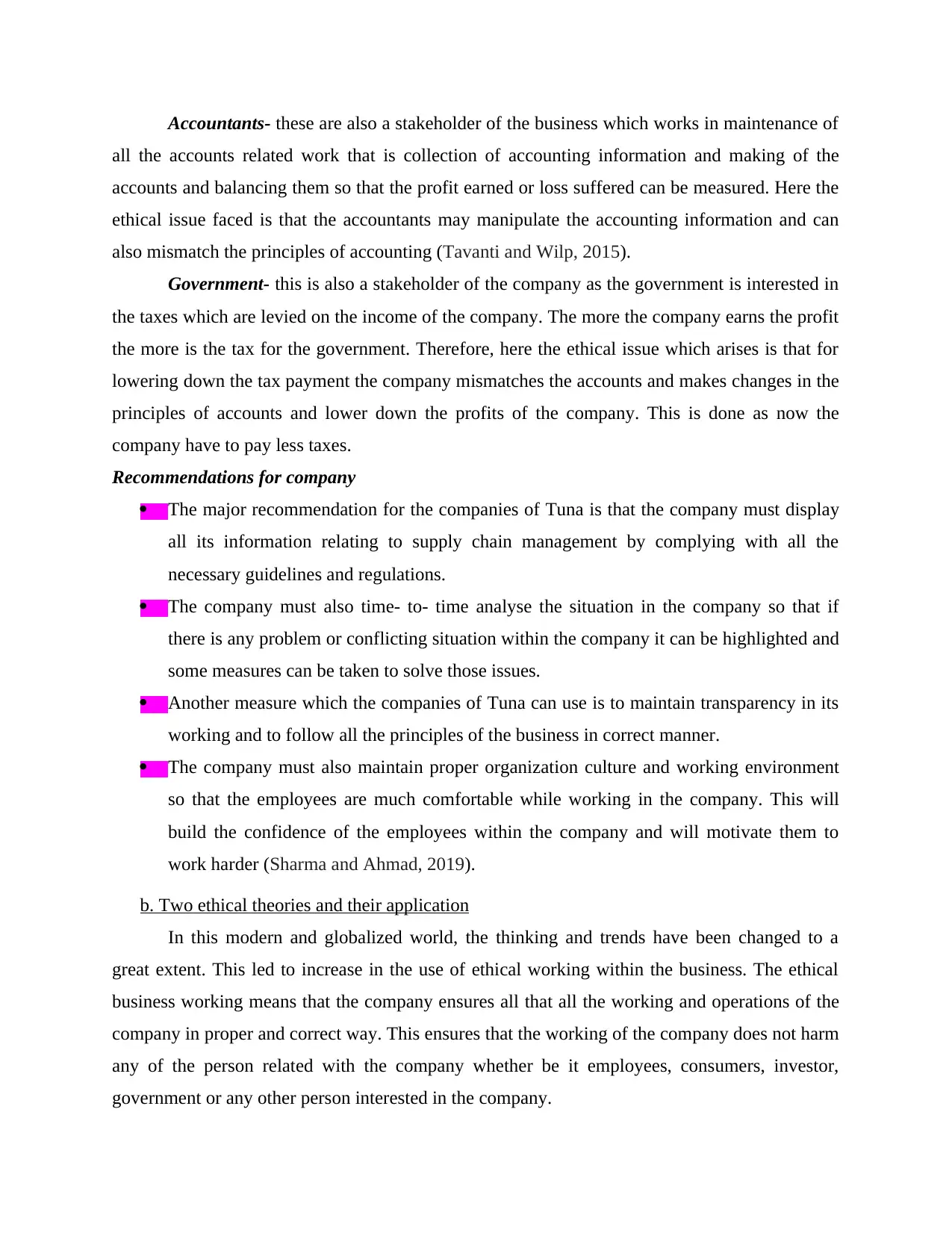
Accountants- these are also a stakeholder of the business which works in maintenance of
all the accounts related work that is collection of accounting information and making of the
accounts and balancing them so that the profit earned or loss suffered can be measured. Here the
ethical issue faced is that the accountants may manipulate the accounting information and can
also mismatch the principles of accounting (Tavanti and Wilp, 2015).
Government- this is also a stakeholder of the company as the government is interested in
the taxes which are levied on the income of the company. The more the company earns the profit
the more is the tax for the government. Therefore, here the ethical issue which arises is that for
lowering down the tax payment the company mismatches the accounts and makes changes in the
principles of accounts and lower down the profits of the company. This is done as now the
company have to pay less taxes.
Recommendations for company
The major recommendation for the companies of Tuna is that the company must display
all its information relating to supply chain management by complying with all the
necessary guidelines and regulations.
The company must also time- to- time analyse the situation in the company so that if
there is any problem or conflicting situation within the company it can be highlighted and
some measures can be taken to solve those issues.
Another measure which the companies of Tuna can use is to maintain transparency in its
working and to follow all the principles of the business in correct manner.
The company must also maintain proper organization culture and working environment
so that the employees are much comfortable while working in the company. This will
build the confidence of the employees within the company and will motivate them to
work harder (Sharma and Ahmad, 2019).
b. Two ethical theories and their application
In this modern and globalized world, the thinking and trends have been changed to a
great extent. This led to increase in the use of ethical working within the business. The ethical
business working means that the company ensures all that all the working and operations of the
company in proper and correct way. This ensures that the working of the company does not harm
any of the person related with the company whether be it employees, consumers, investor,
government or any other person interested in the company.
all the accounts related work that is collection of accounting information and making of the
accounts and balancing them so that the profit earned or loss suffered can be measured. Here the
ethical issue faced is that the accountants may manipulate the accounting information and can
also mismatch the principles of accounting (Tavanti and Wilp, 2015).
Government- this is also a stakeholder of the company as the government is interested in
the taxes which are levied on the income of the company. The more the company earns the profit
the more is the tax for the government. Therefore, here the ethical issue which arises is that for
lowering down the tax payment the company mismatches the accounts and makes changes in the
principles of accounts and lower down the profits of the company. This is done as now the
company have to pay less taxes.
Recommendations for company
The major recommendation for the companies of Tuna is that the company must display
all its information relating to supply chain management by complying with all the
necessary guidelines and regulations.
The company must also time- to- time analyse the situation in the company so that if
there is any problem or conflicting situation within the company it can be highlighted and
some measures can be taken to solve those issues.
Another measure which the companies of Tuna can use is to maintain transparency in its
working and to follow all the principles of the business in correct manner.
The company must also maintain proper organization culture and working environment
so that the employees are much comfortable while working in the company. This will
build the confidence of the employees within the company and will motivate them to
work harder (Sharma and Ahmad, 2019).
b. Two ethical theories and their application
In this modern and globalized world, the thinking and trends have been changed to a
great extent. This led to increase in the use of ethical working within the business. The ethical
business working means that the company ensures all that all the working and operations of the
company in proper and correct way. This ensures that the working of the company does not harm
any of the person related with the company whether be it employees, consumers, investor,
government or any other person interested in the company.
⊘ This is a preview!⊘
Do you want full access?
Subscribe today to unlock all pages.

Trusted by 1+ million students worldwide
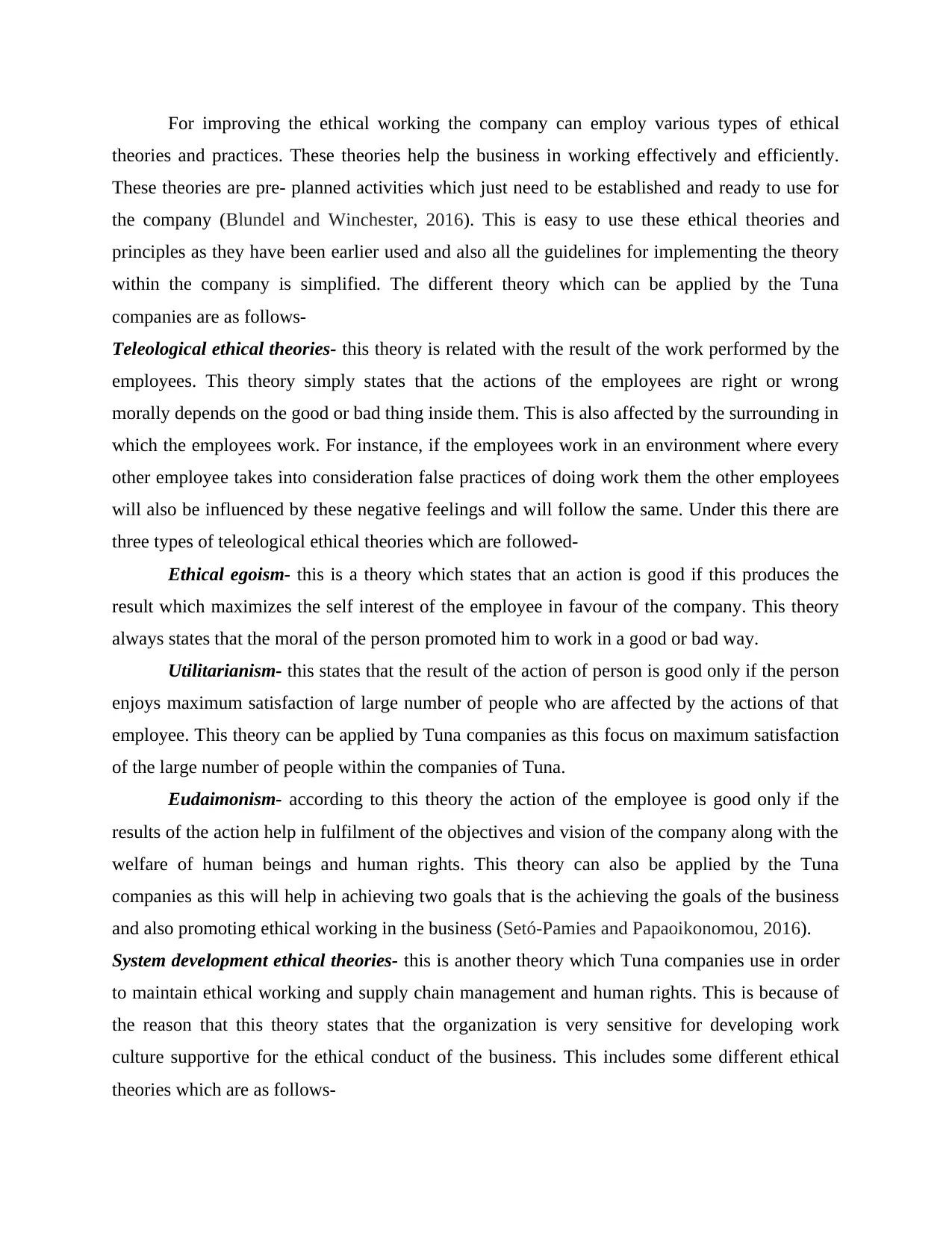
For improving the ethical working the company can employ various types of ethical
theories and practices. These theories help the business in working effectively and efficiently.
These theories are pre- planned activities which just need to be established and ready to use for
the company (Blundel and Winchester, 2016). This is easy to use these ethical theories and
principles as they have been earlier used and also all the guidelines for implementing the theory
within the company is simplified. The different theory which can be applied by the Tuna
companies are as follows-
Teleological ethical theories- this theory is related with the result of the work performed by the
employees. This theory simply states that the actions of the employees are right or wrong
morally depends on the good or bad thing inside them. This is also affected by the surrounding in
which the employees work. For instance, if the employees work in an environment where every
other employee takes into consideration false practices of doing work them the other employees
will also be influenced by these negative feelings and will follow the same. Under this there are
three types of teleological ethical theories which are followed-
Ethical egoism- this is a theory which states that an action is good if this produces the
result which maximizes the self interest of the employee in favour of the company. This theory
always states that the moral of the person promoted him to work in a good or bad way.
Utilitarianism- this states that the result of the action of person is good only if the person
enjoys maximum satisfaction of large number of people who are affected by the actions of that
employee. This theory can be applied by Tuna companies as this focus on maximum satisfaction
of the large number of people within the companies of Tuna.
Eudaimonism- according to this theory the action of the employee is good only if the
results of the action help in fulfilment of the objectives and vision of the company along with the
welfare of human beings and human rights. This theory can also be applied by the Tuna
companies as this will help in achieving two goals that is the achieving the goals of the business
and also promoting ethical working in the business (Setó-Pamies and Papaoikonomou, 2016).
System development ethical theories- this is another theory which Tuna companies use in order
to maintain ethical working and supply chain management and human rights. This is because of
the reason that this theory states that the organization is very sensitive for developing work
culture supportive for the ethical conduct of the business. This includes some different ethical
theories which are as follows-
theories and practices. These theories help the business in working effectively and efficiently.
These theories are pre- planned activities which just need to be established and ready to use for
the company (Blundel and Winchester, 2016). This is easy to use these ethical theories and
principles as they have been earlier used and also all the guidelines for implementing the theory
within the company is simplified. The different theory which can be applied by the Tuna
companies are as follows-
Teleological ethical theories- this theory is related with the result of the work performed by the
employees. This theory simply states that the actions of the employees are right or wrong
morally depends on the good or bad thing inside them. This is also affected by the surrounding in
which the employees work. For instance, if the employees work in an environment where every
other employee takes into consideration false practices of doing work them the other employees
will also be influenced by these negative feelings and will follow the same. Under this there are
three types of teleological ethical theories which are followed-
Ethical egoism- this is a theory which states that an action is good if this produces the
result which maximizes the self interest of the employee in favour of the company. This theory
always states that the moral of the person promoted him to work in a good or bad way.
Utilitarianism- this states that the result of the action of person is good only if the person
enjoys maximum satisfaction of large number of people who are affected by the actions of that
employee. This theory can be applied by Tuna companies as this focus on maximum satisfaction
of the large number of people within the companies of Tuna.
Eudaimonism- according to this theory the action of the employee is good only if the
results of the action help in fulfilment of the objectives and vision of the company along with the
welfare of human beings and human rights. This theory can also be applied by the Tuna
companies as this will help in achieving two goals that is the achieving the goals of the business
and also promoting ethical working in the business (Setó-Pamies and Papaoikonomou, 2016).
System development ethical theories- this is another theory which Tuna companies use in order
to maintain ethical working and supply chain management and human rights. This is because of
the reason that this theory states that the organization is very sensitive for developing work
culture supportive for the ethical conduct of the business. This includes some different ethical
theories which are as follows-
Paraphrase This Document
Need a fresh take? Get an instant paraphrase of this document with our AI Paraphraser
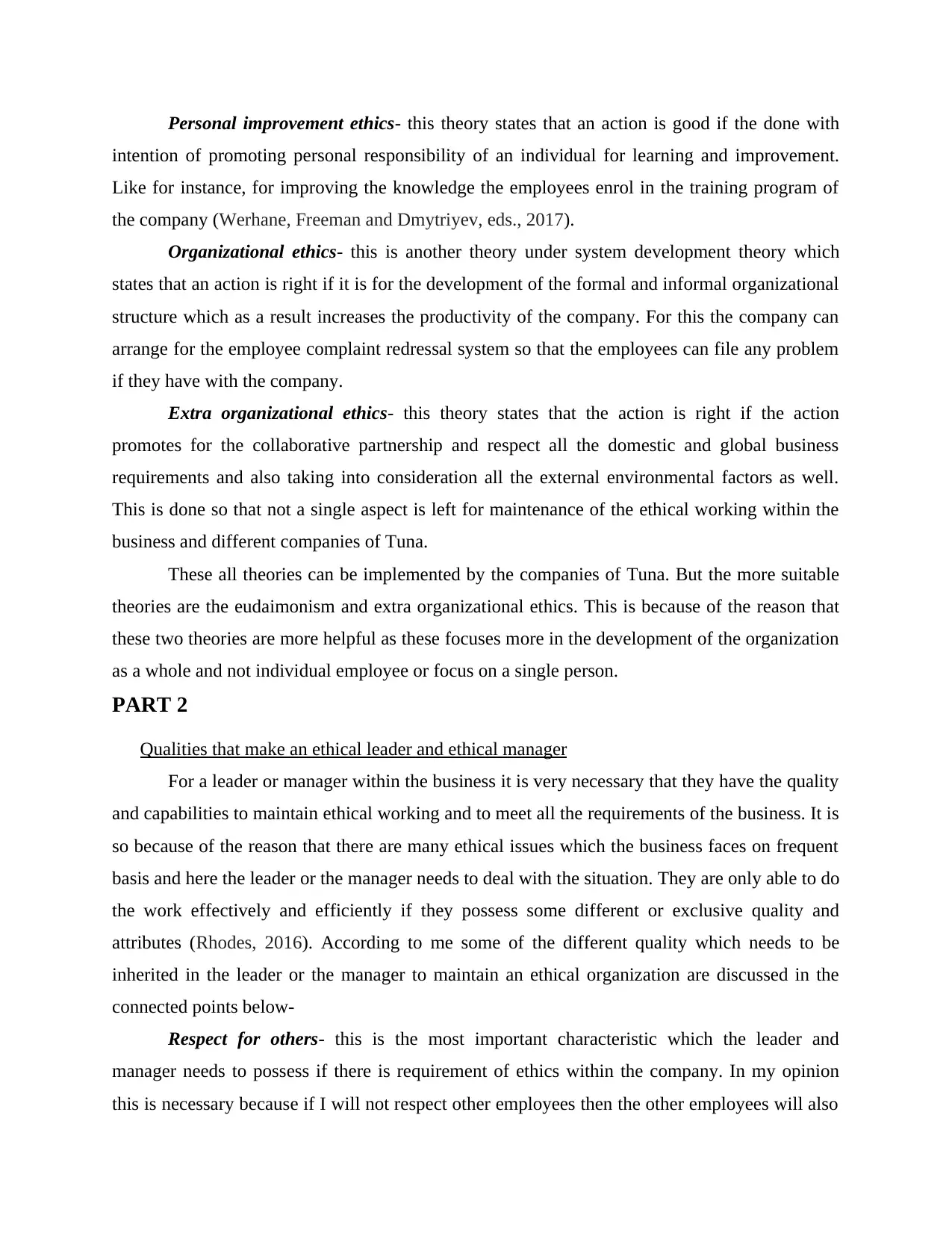
Personal improvement ethics- this theory states that an action is good if the done with
intention of promoting personal responsibility of an individual for learning and improvement.
Like for instance, for improving the knowledge the employees enrol in the training program of
the company (Werhane, Freeman and Dmytriyev, eds., 2017).
Organizational ethics- this is another theory under system development theory which
states that an action is right if it is for the development of the formal and informal organizational
structure which as a result increases the productivity of the company. For this the company can
arrange for the employee complaint redressal system so that the employees can file any problem
if they have with the company.
Extra organizational ethics- this theory states that the action is right if the action
promotes for the collaborative partnership and respect all the domestic and global business
requirements and also taking into consideration all the external environmental factors as well.
This is done so that not a single aspect is left for maintenance of the ethical working within the
business and different companies of Tuna.
These all theories can be implemented by the companies of Tuna. But the more suitable
theories are the eudaimonism and extra organizational ethics. This is because of the reason that
these two theories are more helpful as these focuses more in the development of the organization
as a whole and not individual employee or focus on a single person.
PART 2
Qualities that make an ethical leader and ethical manager
For a leader or manager within the business it is very necessary that they have the quality
and capabilities to maintain ethical working and to meet all the requirements of the business. It is
so because of the reason that there are many ethical issues which the business faces on frequent
basis and here the leader or the manager needs to deal with the situation. They are only able to do
the work effectively and efficiently if they possess some different or exclusive quality and
attributes (Rhodes, 2016). According to me some of the different quality which needs to be
inherited in the leader or the manager to maintain an ethical organization are discussed in the
connected points below-
Respect for others- this is the most important characteristic which the leader and
manager needs to possess if there is requirement of ethics within the company. In my opinion
this is necessary because if I will not respect other employees then the other employees will also
intention of promoting personal responsibility of an individual for learning and improvement.
Like for instance, for improving the knowledge the employees enrol in the training program of
the company (Werhane, Freeman and Dmytriyev, eds., 2017).
Organizational ethics- this is another theory under system development theory which
states that an action is right if it is for the development of the formal and informal organizational
structure which as a result increases the productivity of the company. For this the company can
arrange for the employee complaint redressal system so that the employees can file any problem
if they have with the company.
Extra organizational ethics- this theory states that the action is right if the action
promotes for the collaborative partnership and respect all the domestic and global business
requirements and also taking into consideration all the external environmental factors as well.
This is done so that not a single aspect is left for maintenance of the ethical working within the
business and different companies of Tuna.
These all theories can be implemented by the companies of Tuna. But the more suitable
theories are the eudaimonism and extra organizational ethics. This is because of the reason that
these two theories are more helpful as these focuses more in the development of the organization
as a whole and not individual employee or focus on a single person.
PART 2
Qualities that make an ethical leader and ethical manager
For a leader or manager within the business it is very necessary that they have the quality
and capabilities to maintain ethical working and to meet all the requirements of the business. It is
so because of the reason that there are many ethical issues which the business faces on frequent
basis and here the leader or the manager needs to deal with the situation. They are only able to do
the work effectively and efficiently if they possess some different or exclusive quality and
attributes (Rhodes, 2016). According to me some of the different quality which needs to be
inherited in the leader or the manager to maintain an ethical organization are discussed in the
connected points below-
Respect for others- this is the most important characteristic which the leader and
manager needs to possess if there is requirement of ethics within the company. In my opinion
this is necessary because if I will not respect other employees then the other employees will also
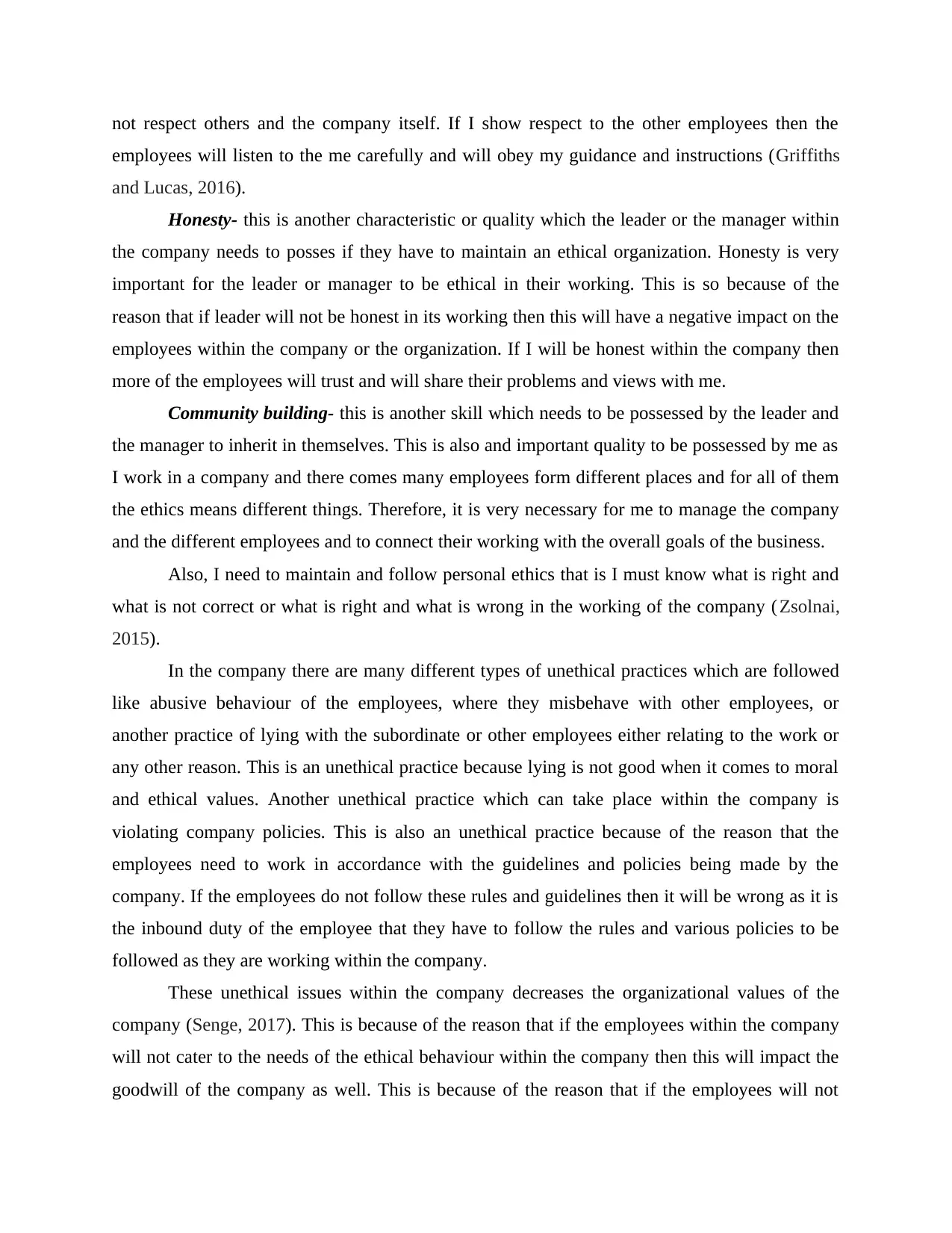
not respect others and the company itself. If I show respect to the other employees then the
employees will listen to the me carefully and will obey my guidance and instructions (Griffiths
and Lucas, 2016).
Honesty- this is another characteristic or quality which the leader or the manager within
the company needs to posses if they have to maintain an ethical organization. Honesty is very
important for the leader or manager to be ethical in their working. This is so because of the
reason that if leader will not be honest in its working then this will have a negative impact on the
employees within the company or the organization. If I will be honest within the company then
more of the employees will trust and will share their problems and views with me.
Community building- this is another skill which needs to be possessed by the leader and
the manager to inherit in themselves. This is also and important quality to be possessed by me as
I work in a company and there comes many employees form different places and for all of them
the ethics means different things. Therefore, it is very necessary for me to manage the company
and the different employees and to connect their working with the overall goals of the business.
Also, I need to maintain and follow personal ethics that is I must know what is right and
what is not correct or what is right and what is wrong in the working of the company ( Zsolnai,
2015).
In the company there are many different types of unethical practices which are followed
like abusive behaviour of the employees, where they misbehave with other employees, or
another practice of lying with the subordinate or other employees either relating to the work or
any other reason. This is an unethical practice because lying is not good when it comes to moral
and ethical values. Another unethical practice which can take place within the company is
violating company policies. This is also an unethical practice because of the reason that the
employees need to work in accordance with the guidelines and policies being made by the
company. If the employees do not follow these rules and guidelines then it will be wrong as it is
the inbound duty of the employee that they have to follow the rules and various policies to be
followed as they are working within the company.
These unethical issues within the company decreases the organizational values of the
company (Senge, 2017). This is because of the reason that if the employees within the company
will not cater to the needs of the ethical behaviour within the company then this will impact the
goodwill of the company as well. This is because of the reason that if the employees will not
employees will listen to the me carefully and will obey my guidance and instructions (Griffiths
and Lucas, 2016).
Honesty- this is another characteristic or quality which the leader or the manager within
the company needs to posses if they have to maintain an ethical organization. Honesty is very
important for the leader or manager to be ethical in their working. This is so because of the
reason that if leader will not be honest in its working then this will have a negative impact on the
employees within the company or the organization. If I will be honest within the company then
more of the employees will trust and will share their problems and views with me.
Community building- this is another skill which needs to be possessed by the leader and
the manager to inherit in themselves. This is also and important quality to be possessed by me as
I work in a company and there comes many employees form different places and for all of them
the ethics means different things. Therefore, it is very necessary for me to manage the company
and the different employees and to connect their working with the overall goals of the business.
Also, I need to maintain and follow personal ethics that is I must know what is right and
what is not correct or what is right and what is wrong in the working of the company ( Zsolnai,
2015).
In the company there are many different types of unethical practices which are followed
like abusive behaviour of the employees, where they misbehave with other employees, or
another practice of lying with the subordinate or other employees either relating to the work or
any other reason. This is an unethical practice because lying is not good when it comes to moral
and ethical values. Another unethical practice which can take place within the company is
violating company policies. This is also an unethical practice because of the reason that the
employees need to work in accordance with the guidelines and policies being made by the
company. If the employees do not follow these rules and guidelines then it will be wrong as it is
the inbound duty of the employee that they have to follow the rules and various policies to be
followed as they are working within the company.
These unethical issues within the company decreases the organizational values of the
company (Senge, 2017). This is because of the reason that if the employees within the company
will not cater to the needs of the ethical behaviour within the company then this will impact the
goodwill of the company as well. This is because of the reason that if the employees will not
⊘ This is a preview!⊘
Do you want full access?
Subscribe today to unlock all pages.

Trusted by 1+ million students worldwide
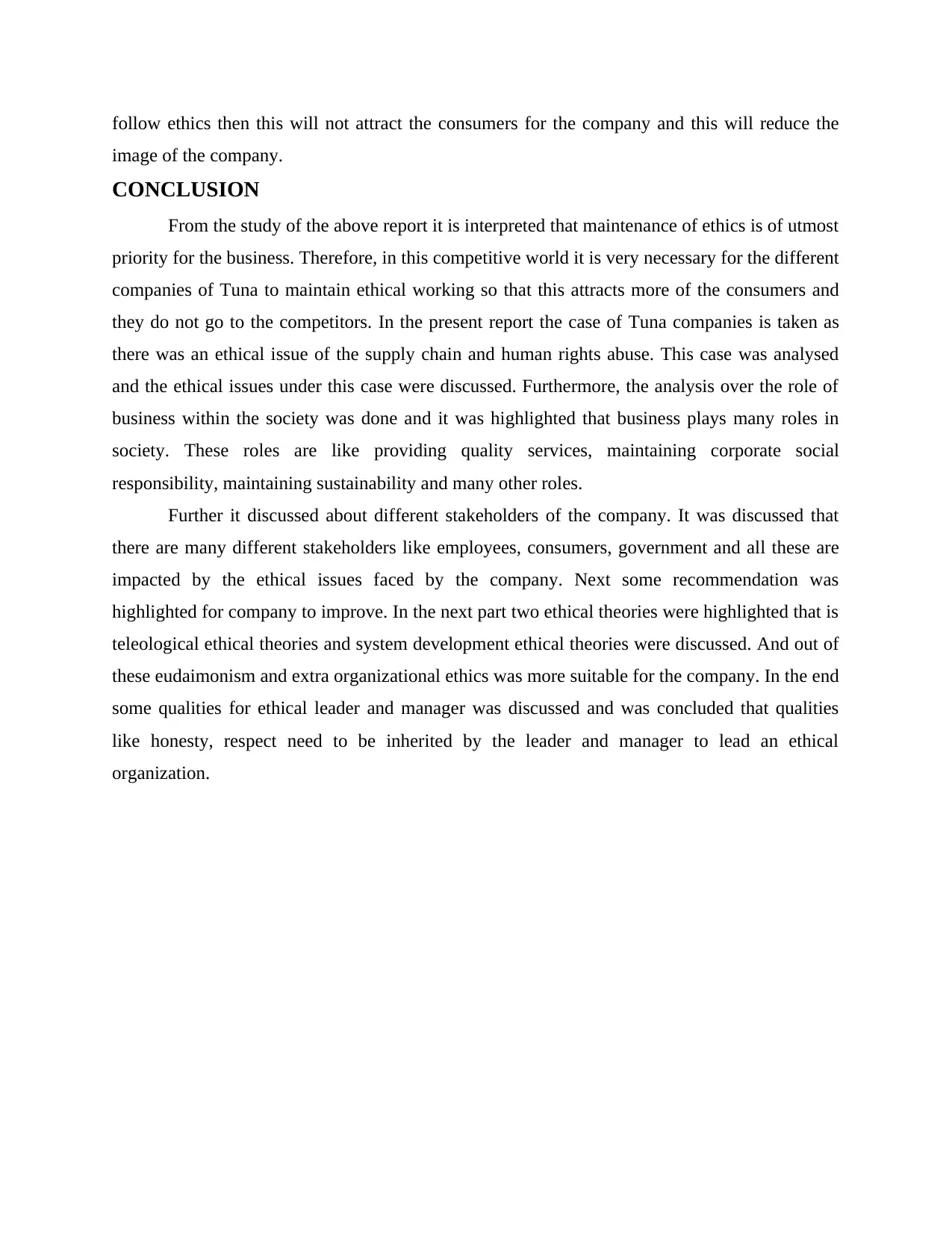
follow ethics then this will not attract the consumers for the company and this will reduce the
image of the company.
CONCLUSION
From the study of the above report it is interpreted that maintenance of ethics is of utmost
priority for the business. Therefore, in this competitive world it is very necessary for the different
companies of Tuna to maintain ethical working so that this attracts more of the consumers and
they do not go to the competitors. In the present report the case of Tuna companies is taken as
there was an ethical issue of the supply chain and human rights abuse. This case was analysed
and the ethical issues under this case were discussed. Furthermore, the analysis over the role of
business within the society was done and it was highlighted that business plays many roles in
society. These roles are like providing quality services, maintaining corporate social
responsibility, maintaining sustainability and many other roles.
Further it discussed about different stakeholders of the company. It was discussed that
there are many different stakeholders like employees, consumers, government and all these are
impacted by the ethical issues faced by the company. Next some recommendation was
highlighted for company to improve. In the next part two ethical theories were highlighted that is
teleological ethical theories and system development ethical theories were discussed. And out of
these eudaimonism and extra organizational ethics was more suitable for the company. In the end
some qualities for ethical leader and manager was discussed and was concluded that qualities
like honesty, respect need to be inherited by the leader and manager to lead an ethical
organization.
image of the company.
CONCLUSION
From the study of the above report it is interpreted that maintenance of ethics is of utmost
priority for the business. Therefore, in this competitive world it is very necessary for the different
companies of Tuna to maintain ethical working so that this attracts more of the consumers and
they do not go to the competitors. In the present report the case of Tuna companies is taken as
there was an ethical issue of the supply chain and human rights abuse. This case was analysed
and the ethical issues under this case were discussed. Furthermore, the analysis over the role of
business within the society was done and it was highlighted that business plays many roles in
society. These roles are like providing quality services, maintaining corporate social
responsibility, maintaining sustainability and many other roles.
Further it discussed about different stakeholders of the company. It was discussed that
there are many different stakeholders like employees, consumers, government and all these are
impacted by the ethical issues faced by the company. Next some recommendation was
highlighted for company to improve. In the next part two ethical theories were highlighted that is
teleological ethical theories and system development ethical theories were discussed. And out of
these eudaimonism and extra organizational ethics was more suitable for the company. In the end
some qualities for ethical leader and manager was discussed and was concluded that qualities
like honesty, respect need to be inherited by the leader and manager to lead an ethical
organization.
Paraphrase This Document
Need a fresh take? Get an instant paraphrase of this document with our AI Paraphraser
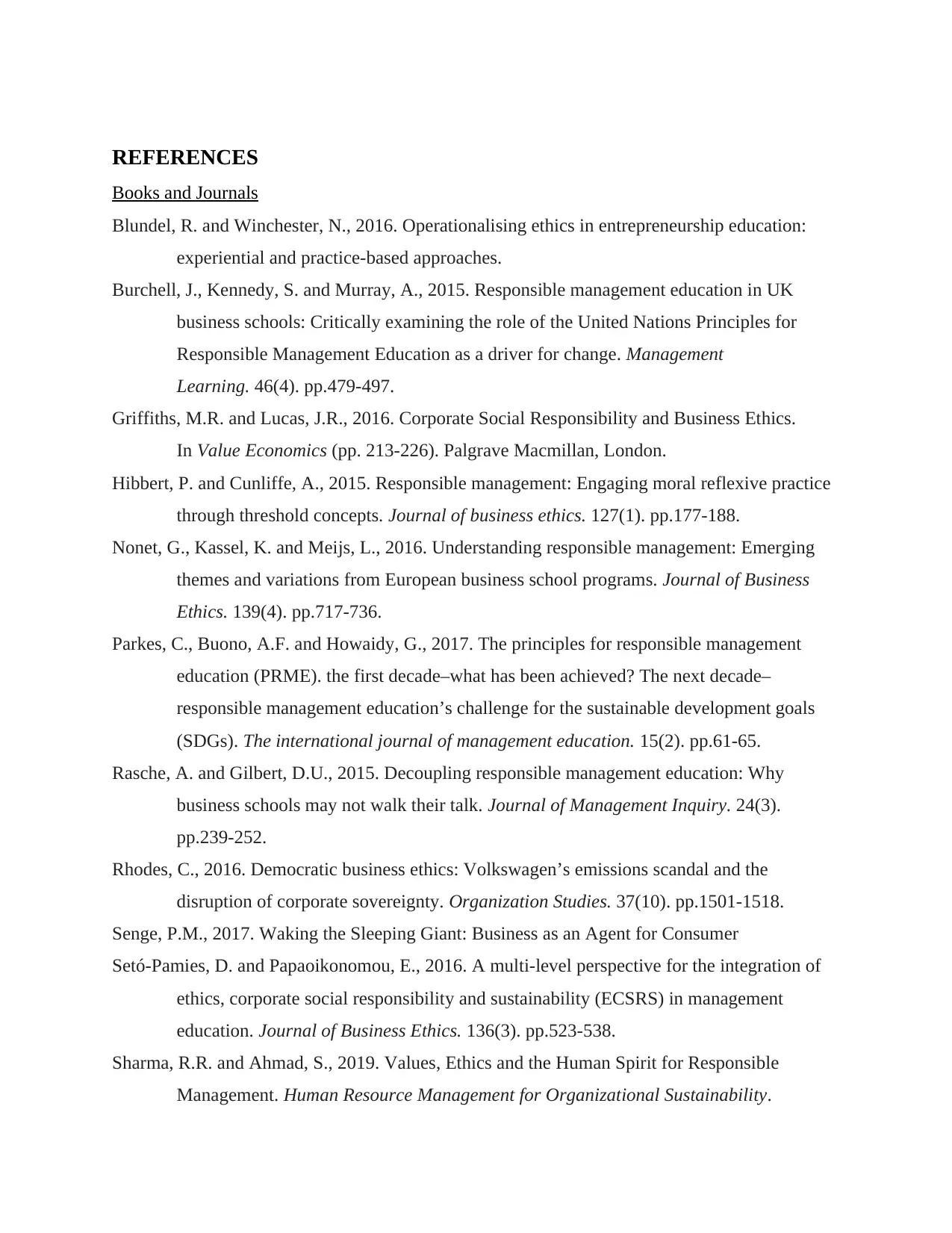
REFERENCES
Books and Journals
Blundel, R. and Winchester, N., 2016. Operationalising ethics in entrepreneurship education:
experiential and practice-based approaches.
Burchell, J., Kennedy, S. and Murray, A., 2015. Responsible management education in UK
business schools: Critically examining the role of the United Nations Principles for
Responsible Management Education as a driver for change. Management
Learning. 46(4). pp.479-497.
Griffiths, M.R. and Lucas, J.R., 2016. Corporate Social Responsibility and Business Ethics.
In Value Economics (pp. 213-226). Palgrave Macmillan, London.
Hibbert, P. and Cunliffe, A., 2015. Responsible management: Engaging moral reflexive practice
through threshold concepts. Journal of business ethics. 127(1). pp.177-188.
Nonet, G., Kassel, K. and Meijs, L., 2016. Understanding responsible management: Emerging
themes and variations from European business school programs. Journal of Business
Ethics. 139(4). pp.717-736.
Parkes, C., Buono, A.F. and Howaidy, G., 2017. The principles for responsible management
education (PRME). the first decade–what has been achieved? The next decade–
responsible management education’s challenge for the sustainable development goals
(SDGs). The international journal of management education. 15(2). pp.61-65.
Rasche, A. and Gilbert, D.U., 2015. Decoupling responsible management education: Why
business schools may not walk their talk. Journal of Management Inquiry. 24(3).
pp.239-252.
Rhodes, C., 2016. Democratic business ethics: Volkswagen’s emissions scandal and the
disruption of corporate sovereignty. Organization Studies. 37(10). pp.1501-1518.
Senge, P.M., 2017. Waking the Sleeping Giant: Business as an Agent for Consumer
Setó-Pamies, D. and Papaoikonomou, E., 2016. A multi-level perspective for the integration of
ethics, corporate social responsibility and sustainability (ECSRS) in management
education. Journal of Business Ethics. 136(3). pp.523-538.
Sharma, R.R. and Ahmad, S., 2019. Values, Ethics and the Human Spirit for Responsible
Management. Human Resource Management for Organizational Sustainability.
Books and Journals
Blundel, R. and Winchester, N., 2016. Operationalising ethics in entrepreneurship education:
experiential and practice-based approaches.
Burchell, J., Kennedy, S. and Murray, A., 2015. Responsible management education in UK
business schools: Critically examining the role of the United Nations Principles for
Responsible Management Education as a driver for change. Management
Learning. 46(4). pp.479-497.
Griffiths, M.R. and Lucas, J.R., 2016. Corporate Social Responsibility and Business Ethics.
In Value Economics (pp. 213-226). Palgrave Macmillan, London.
Hibbert, P. and Cunliffe, A., 2015. Responsible management: Engaging moral reflexive practice
through threshold concepts. Journal of business ethics. 127(1). pp.177-188.
Nonet, G., Kassel, K. and Meijs, L., 2016. Understanding responsible management: Emerging
themes and variations from European business school programs. Journal of Business
Ethics. 139(4). pp.717-736.
Parkes, C., Buono, A.F. and Howaidy, G., 2017. The principles for responsible management
education (PRME). the first decade–what has been achieved? The next decade–
responsible management education’s challenge for the sustainable development goals
(SDGs). The international journal of management education. 15(2). pp.61-65.
Rasche, A. and Gilbert, D.U., 2015. Decoupling responsible management education: Why
business schools may not walk their talk. Journal of Management Inquiry. 24(3).
pp.239-252.
Rhodes, C., 2016. Democratic business ethics: Volkswagen’s emissions scandal and the
disruption of corporate sovereignty. Organization Studies. 37(10). pp.1501-1518.
Senge, P.M., 2017. Waking the Sleeping Giant: Business as an Agent for Consumer
Setó-Pamies, D. and Papaoikonomou, E., 2016. A multi-level perspective for the integration of
ethics, corporate social responsibility and sustainability (ECSRS) in management
education. Journal of Business Ethics. 136(3). pp.523-538.
Sharma, R.R. and Ahmad, S., 2019. Values, Ethics and the Human Spirit for Responsible
Management. Human Resource Management for Organizational Sustainability.
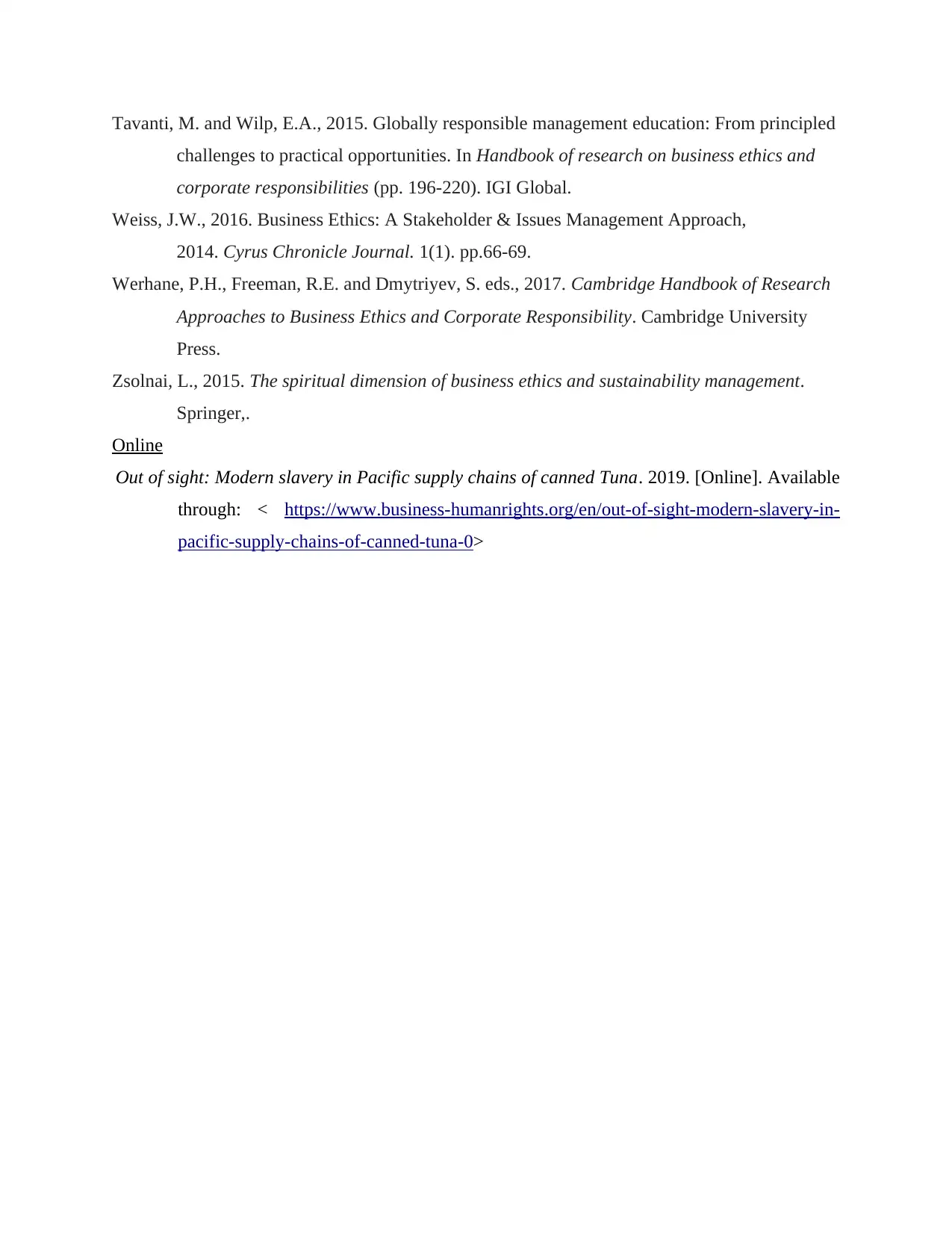
Tavanti, M. and Wilp, E.A., 2015. Globally responsible management education: From principled
challenges to practical opportunities. In Handbook of research on business ethics and
corporate responsibilities (pp. 196-220). IGI Global.
Weiss, J.W., 2016. Business Ethics: A Stakeholder & Issues Management Approach,
2014. Cyrus Chronicle Journal. 1(1). pp.66-69.
Werhane, P.H., Freeman, R.E. and Dmytriyev, S. eds., 2017. Cambridge Handbook of Research
Approaches to Business Ethics and Corporate Responsibility. Cambridge University
Press.
Zsolnai, L., 2015. The spiritual dimension of business ethics and sustainability management.
Springer,.
Online
Out of sight: Modern slavery in Pacific supply chains of canned Tuna. 2019. [Online]. Available
through: < https://www.business-humanrights.org/en/out-of-sight-modern-slavery-in-
pacific-supply-chains-of-canned-tuna-0>
challenges to practical opportunities. In Handbook of research on business ethics and
corporate responsibilities (pp. 196-220). IGI Global.
Weiss, J.W., 2016. Business Ethics: A Stakeholder & Issues Management Approach,
2014. Cyrus Chronicle Journal. 1(1). pp.66-69.
Werhane, P.H., Freeman, R.E. and Dmytriyev, S. eds., 2017. Cambridge Handbook of Research
Approaches to Business Ethics and Corporate Responsibility. Cambridge University
Press.
Zsolnai, L., 2015. The spiritual dimension of business ethics and sustainability management.
Springer,.
Online
Out of sight: Modern slavery in Pacific supply chains of canned Tuna. 2019. [Online]. Available
through: < https://www.business-humanrights.org/en/out-of-sight-modern-slavery-in-
pacific-supply-chains-of-canned-tuna-0>
⊘ This is a preview!⊘
Do you want full access?
Subscribe today to unlock all pages.

Trusted by 1+ million students worldwide
1 out of 12
Related Documents
Your All-in-One AI-Powered Toolkit for Academic Success.
+13062052269
info@desklib.com
Available 24*7 on WhatsApp / Email
![[object Object]](/_next/static/media/star-bottom.7253800d.svg)
Unlock your academic potential
Copyright © 2020–2026 A2Z Services. All Rights Reserved. Developed and managed by ZUCOL.





